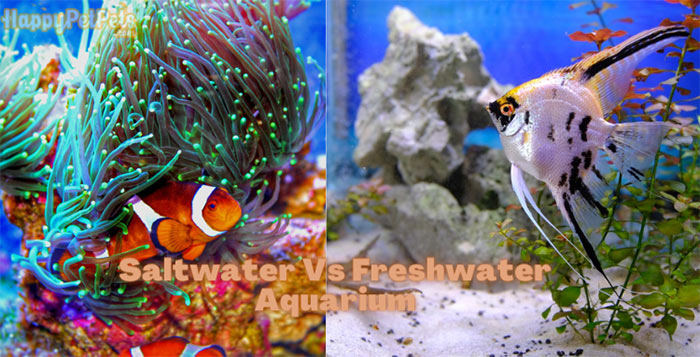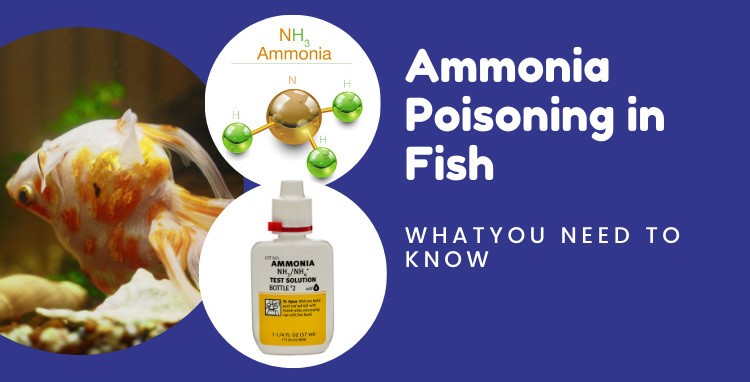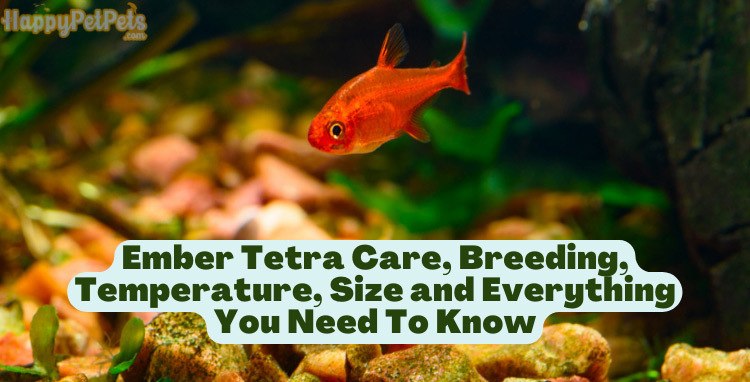There are a lot of factors to consider when deciding which kind of fish tank is ideal for your needs.
Most people assume that a marine aquarium is more difficult to operate and maintain than a freshwater aquarium, making it a poor option for a beginning.
A freshwater aquarium vs. a coral reef aquarium is discussed in this side-by-by comparison, which examines the differences between saltwater and freshwater species. Saltwater Vs Freshwater Aquarium
How Are Saltwater and Freshwater Aquariums Different?
A saltwater aquarium incorporates saltwater, while a freshwater aquarium utilizes freshwater as the primary ingredient.
Saltwater tanks may be used to keep tropical marine fish species and other marine life that would normally be found in the ocean.
A freshwater tank, on the other hand, is a habitat for coldwater or tropical fish and aquatic plants that can’t tolerate salt.
Saltwater Vs Freshwater Aquarium
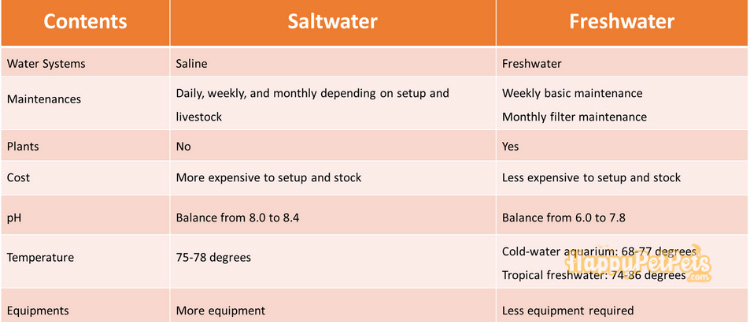
How Are Saltwater and Freshwater Aquariums Different?
What Makes A Saltwater Aquarium Special?
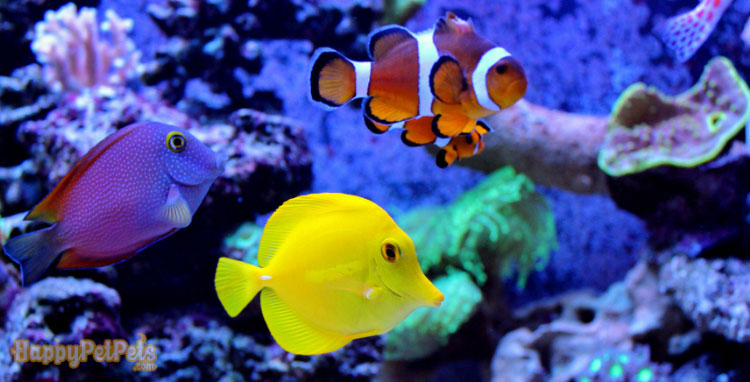
Amazing coral reef aquarium moment
The diversity of fish and other organisms that may be housed in a saltwater aquarium is one of its most appealing aspects.With a variety of fish, shrimp, anemones, coral, and other things, you may create a lovely aquarium with a lot of variety.
Saltwater Aquariums Have Both Advantages and Disadvantages.
Keeping a saltwater aquarium has both advantages and disadvantages:
Pros
Let’s start with the advantages of a marine setup:
- Invertebrates, coral, anemones, and a large variety of fish may all be found in the ocean.
- In a reef tank or marine tank, you may build some very stunning aquascapes.
- Observing fish swimming in a well-maintained tank has been scientifically demonstrated to have positive effects on both health and wellbeing.
Cons
Unfortunately, the drawbacks of maintaining a saltwater aquarium exceed the benefits.
- In general, saltwater tanks are not recommended for novices.
- In contrast to freshwater species, saltwater fish are often far more costly to purchase.
- The initial expenditure for a saltwater tank is substantially more than for a fresh – water tank since you need a lot more specialized equipment.
- In comparison to freshwater, saltwater stores only around 80% of the Oxy that it does in freshwater. To ensure your fish can breathe, you’ll need a bigger tank than you would for freshwater species.
- If you have a larger aquarium, you’ll need a special stand for it, which will take up a lot of room in your house and be more expensive to acquire.
- More care and attention is required for a marine aquarium vs a freshwater one. You’ll have a lot of work to do on an everyday, biweekly, and monthly basis if you want to maintain the aquarium in excellent condition.
- When it comes to nutrition, certain saltwater fish are picky, and this may be costly in terms of both food costs and preparation time.
- If you don’t have a really big tank with lots of hiding spots, it’s difficult to maintain a peaceful community of marine fish and invertebrates.
- Salinity and water quality are critical to the health of a marine aquarium. There will be constant monitoring of the water quality parameters and modifications to be made if necessary.
- Saltwater fish are sensitive and have significant death rates, which is especially heartbreaking considering the hefty expense of replacing them.
- Algae is a problem for all fish tanks, but saltwater tanks are more prone to developing algae since there are no real plants to use nutrients and starve it.
The Best Saltwater Fish For Novices Are Those Listed Below.
If you’re new to saltwater fishkeeping, you may choose to start with one of these species. The following marine fish are ideal for beginners:
- Dwarf Angelfish
- Damselfish
- Tangs
- And the Clownfish.
All of these fish are highly colorful and exciting to watch, and they are frequently not as costly to purchase as rarer species.
What Makes a Freshwater Aquarium the Best?
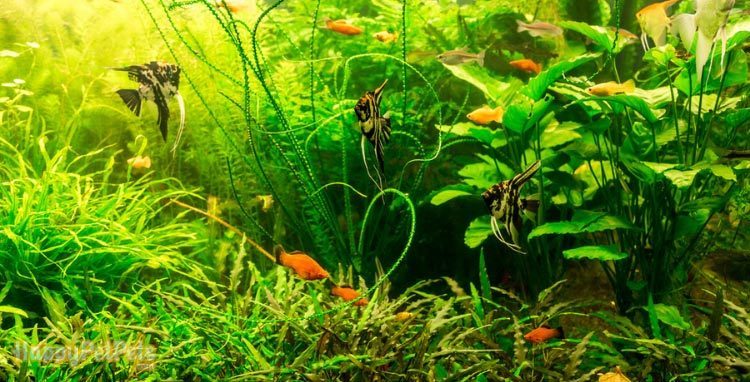
A green beautiful planted tropical freshwater aquarium with fishes
There are hundreds of freshwater fish and invertebrates that may co-exist peacefully in a community tank.
As a result, freshwater fish are often less costly to purchase than sea ones.
A Freshwater Aquarium Has Both Advantages and Disadvantages
Keeping freshwater fish has its advantages and disadvantages.
Pros
- When it comes to first-time fish owners, fresh – water fish are often thought of as a better choice because of their lower care requirements.
- Compared to marine species, tropical, coldwater freshwater fish are usually less expensive to purchase.
- Compared to a saltwater tank, the expense of setting up a freshwater tank is far cheaper.
- Many different kinds of nano fish may be successfully kept in small tank. This implies that even if your house has a restricted amount of area, you may still take pleasure in fishkeeping.
- It’s possible to maintain a tiny tank on your desk or counter without the need for an aquarium stand if you like.
- Only weekly water changes and monthly filter maintenance are required to keep a freshwater tank running well.
- Most freshwater fish are simple to feed because of their low nutrient requirements.
- Many tropical and cold-water freshwater fish may be incorporated in a tranquil and harmonious community aquarium design.
- If you have a fresh – water tank, you can grow plants in it. Because plants can also use nitrates to combat algae, they assist to keep water quality high.
Cons
- In general, freshwater fish are less vibrantly colored or unusually shaped and formed than their oceanic counterparts.
- General tank care requires around an hour of your time each week.
The Best Freshwater Fish for Beginners
A handful of the top freshwater species for novices are included below:
- Betta fish
- Cichlids
- Common goldfish
- Tetras
All of these fish are easy to care for and cost-effective to buy.
Cost of a Freshwater Aquarium vs. a Saltwater Aquarium
The expense of putting up a saltwater aquarium is more than the cost of doing the same thing with a freshwater aquarium.Everything you’ll need to get your tank up and running is listed here.
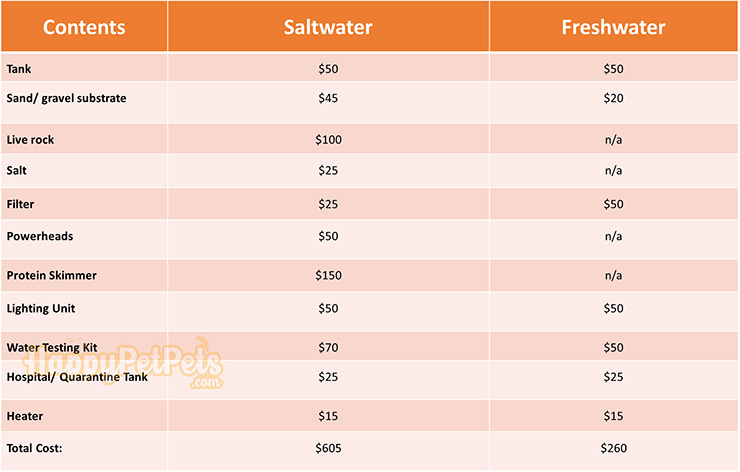
Cost of a Freshwater Aquarium vs. a Saltwater Aquarium
The expense of a saltwater aquarium is, therefore, about two times that of a freshwater aquarium.
When it comes to marine setups, you’ll need at least a 75-gallon tank, although you may not need that much space for your fish. Smaller tanks often come in kit form, you won’t have to purchase separate lighting systems, filters and heaters…
What About the Fish
You’ll also have to account for the expense of purchasing fish to put in your aquarium.
Costs may vary based on the rarity and size of the fish and invertebrates you pick.
Most freshwater fish cost between a few dollars and ten dollars, and you can frequently save money by purchasing a group of fish, which is perfect for schooling species like tetras.
Prices for marine fish, on the other hand, may start as low as $20 and go up from there. For the most part, the sky is the limit.
Costs of Operations
Running expenses for fresh water and salt water tanks are similar in terms of power use. However, marine tank water testing kits are more expensive than freshwater tank water testing kits. For a marine tank, you’ll need to purchase salt, but you don’t for a freshwater tank.
Myths about Freshwater vs. Saltwater Aquariums
Aquariums With Freshwater Are Simpler to Care
Saltwater tanks, on the other hand, are more difficult to maintain and stay healthy.
As with freshwater rivers, lakes, ponds, etc., the marine ecosystem tends to be more stable than that of freshwater. The pH and salinity of the ocean are rather stable. But in freshwater environments, the chemistry of the water is continually changing because of seasonal fluctuations like droughts and floods, for example.
As a result, freshwater fish species are more tolerant to water changes than their saltwater counterparts.
It Is Not Recommended for Beginners to Keep Saltwater Aquariums
That is, to some extent, true, but only to a certain degree.
You’ll have to spend more money on saltwater fish and the tools you’ll need to care for them than you would on freshwater fish. Getting things wrong might cost you a lot of money since beginners often make errors and fish death is frequent.
Keep or discard, the complexity of your saltwater tank will depend on your goals:
- Fishing with live rock
- Reefing with live rock
- Fish only
A fish-only aquarium is easy to put up, but a reef aquarium is a lot more difficult.
A marine tank must be bigger than a freshwater tank, as previously stated. As a result, doing routine maintenance takes more time.
Having said that, beginners may maintain marines if they start with a fish-only 75-gallon tank, choose a simple starting fish species, and are careful with their upkeep.
Converting a Saltwater Tank to a Fresh Water Aquarium Is Not Possible
A saltwater tank can be converted to a freshwater tank, yes.Remove everything from the tank and use dechlorinated water to thoroughly clean it. Take special care to remove salt deposits from the tank’s outside.
Aquarium Fish May Be Raised in Captivity, Including Saltwater and Freshwater Varieties
One of the reasons saltwater fish are so costly is because the majority of them are captured in the wild.
That’s because raising marine fish in captivity is extremely difficult. When it comes to keeping saltwater fish in an aquarium, it might be difficult to replicate their natural breeding cycles.
Many freshwater fish species, on the other hand, easily reproduce in a home aquarium. As a result, even a novice aquarist will enjoy seeing their fish lay eggs and raise live fry.
So, if you want to breed your fish, you should go with a freshwater environment.
Aquariums With Saltwater Are Plagued by More Algae Than Those With Freshwater
Yes, exactly!
The Algae Is The nitrogen cycle results in nitrates, which are present in all aquarium water. Nitrates serve as a food supply for algae. Nitrates are also absorbed by plants, but only freshwater plants may live. It’s because of this that algae can’t grow and spread as quickly in a freshwater tank with real plants since they lack the nutrients they require. A Yes, exactly! In saltwater aquariums, there is a bigger problem.
The Size of Saltwater Aquariums Is Necessary
Freshwater holds more oxygen than saltwater. Because of this, you want a bigger tank with a larger surface area to allow for the most possible gas exchange. In other words, there isn’t enough oxygen in a saltwater tank to sustain as many fish.
A number of plants may be included in a freshwater tank as well. Photosynthesis, the process by which plants make oxygen and absorb CO2, contributes to the oxygenation of the water for fish.
So, whether you’re looking for a tiny tank or a lot of fish, a freshwater tank is the best option.
Conclusion
For a newbie who wants a small tank with a lot of colorful, robust fish, a freshwater tank is the best option. ” In addition to being less expensive to purchase and operate, a freshwater system also requires less time for upkeep. If you so choose, you may even breed your fish.
Saltwater fish may be a challenge for aquarists with greater expertise and time to commit to tank care. A bigger tank necessitates more floor space, and you’ll be limited in the number of fish you can maintain. There are, however, a greater number of species to choose from, and the majority of them are far more colorful and entertaining to have as pets. Marine species are more costly and more delicate than their freshwater counterparts.
A freshwater or a saltwater aquarium is what you need. If you’ve got an aquarium, tell us about it! You may also leave a comment with any queries you might have.
Read more: https://happypetpets.com/

